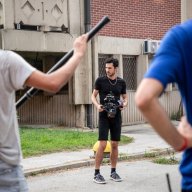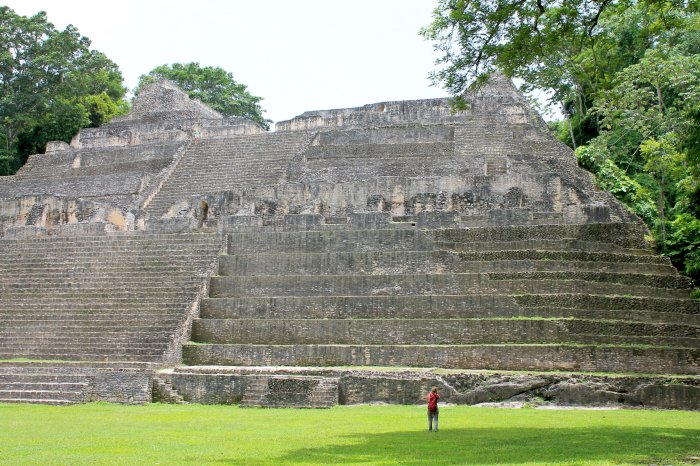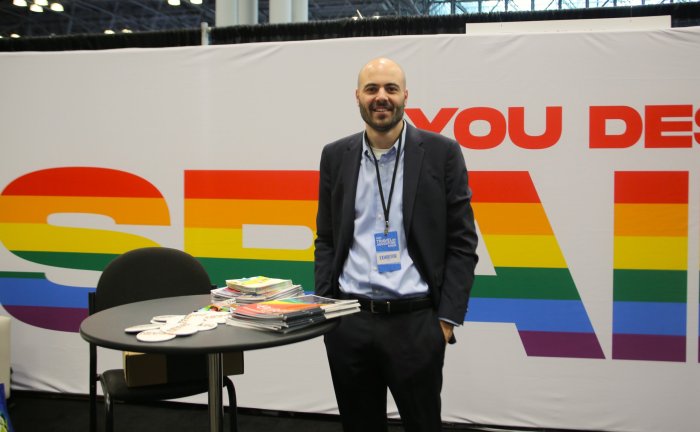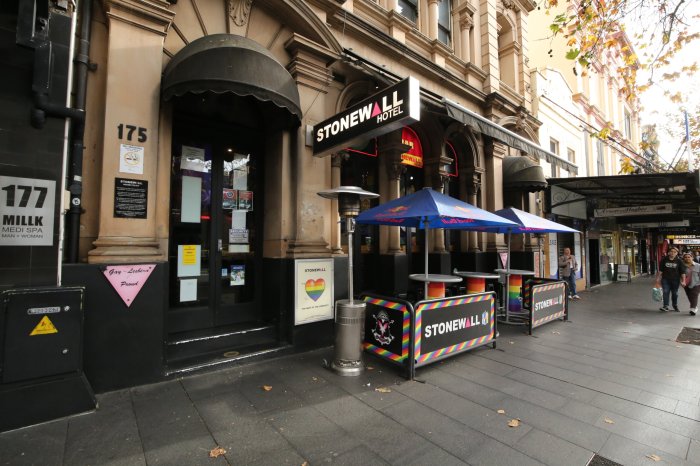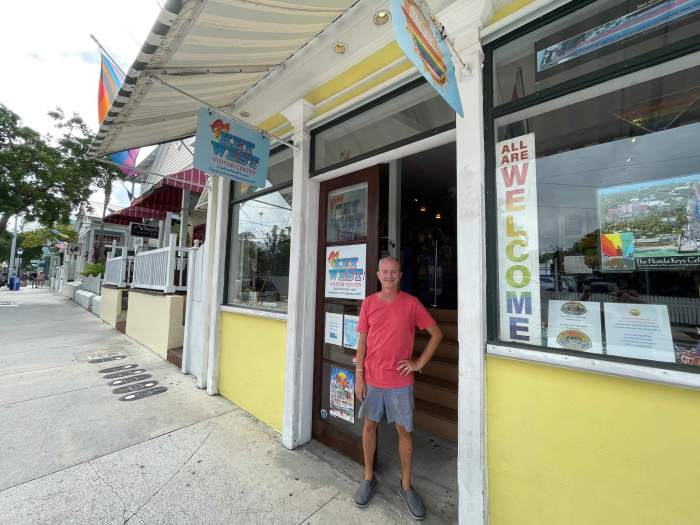 BY TYMON MANNING | As a muscled male model playfully flits across the screen on my favorite Peruvian show, “Combate,” my host sister calls him, in English, a butterfly.
BY TYMON MANNING | As a muscled male model playfully flits across the screen on my favorite Peruvian show, “Combate,” my host sister calls him, in English, a butterfly.
“Como se dice ‘butterfly’ en Español?” I innocently ask. “Homosexual,” she replies.
A smile is all I can think of as an appropriate response. To pursue this point any further would bring my own sexual orientation into question — or so I fear.
To ignore it, however, is to silently condone the stereotypes I openly fought back in the US. I am very clear on that point.
Welcome to the awkward world of reentering the closet as a Peace Corps volunteer in a Third World country.
I want to make clear at the outset that I would never accuse the Peace Corps of forcing its volunteers into the closet. To be sure, I have been encouraged to keep my sexual orientation to myself. But I was similarly urged not to date a Peruvian woman in the community where I live and work.
The advice regarding my sexual orientation is, unfortunately, appropriate, regrettable as that is. The suggestions regarding dating locals, I must confess, has actually come in handy as an excuse for not pursuing women here.
As an American, I am already viewed as an outsider in Peru. I have little doubt that being out as a gay man would make my work here impossible. I have known and heard of LGBT volunteers who headed home early because of problems, including harassment, that ensued from their sexual orientation becoming known. Some who departed have publicly accused the Peace Corps of homophobia, of not supporting their LGBT volunteers, and of contributing to the ignorance about gay people in the places where they work.
My experience has been my own; I can’t speak to the experiences of others nor can I lay out exactly what future LGBT volunteers should expect.
When applying to the Peace Corps, I decided to discuss my sexual orientation with the recruiter, concluding that no good would come from dishonesty or obfuscation. My bigger concern, in fact, was my vegetarianism, but that is another issue — a failed one, at that.
From the time I came out in the application process, I received a very real picture of what life could and probably would be like for me were I to press on with my effort to join. Peace Corps personnel directed me to a range of helpful information resources and lauded me for my alleged bravery. I exchanged sporadic emails with current and returned volunteers from countries around the world, but without knowing where I would be placed, I wasn’t able to assemble a clear picture of exactly how my experience would play out.
As I later found out, no one can tell you what your experience will be like, and the advice I received from those initial emails was really no different than what I heard from volunteers in Peru once I learned of my assignment.
The information I drew from my correspondences and research fell into three general categories:
Your experience as an LGBT volunteer will vary primarily based on your country assignment and your work site.
I currently serve in the mountains of Peru’s poorest state, and it is a very conservative community. Except for the anecdote I described above and one other occasion with my host parents, sexual orientation has not come up in discussions with anyone in my town.
A fellow volunteer, however, has observed a gay community in her town. I can’t say for sure if I would reveal my sexual orientation were I working in her town, but it would present a completely different situation. She tells me she is free to discuss homosexuality in her classes and in working on her projects. Given the lack of discourse on the subject in my town, I frankly fear that broaching it would likely point the gay finger at me as it sometimes does even in places in the US where homosexuality remains invisible.
It’s worth noting that the advice I got talked about the significance of the country assignment, not the specifics of Peace Corp leadership on the ground. Peace Corps staff in-country play a huge role in our experiences, but they are well trained to be sensitive to LGBT issues. I have rarely encountered anything offensive from PC leadership regarding my sexual orientation, and have never come across any malicious intent.
In fact, I was recently invited to the Lima office to assist in an LGBT sensitivity training for our regional coordinators and Peace Corps volunteer leaders.
Gay life in Peru seems defined largely by the concentration of the nation’s population in Lima, the capital, where nearly 30 percent of its residents live. In fact, the capital’s preeminence has all sorts of implications for its culture. A gay night out means traveling to the Miraflores district in Lima, where gay clubs exist and same-sex couples hold hands in public.
I have also visited two of Peru’s other large cities, much less populous than Lima; gaycities.com offered nothing for me there and Grindr became a ghost town. One returned volunteer claimed other large cities besides Lima have gay clubs, but they have eluded me.
When I am in Lima, it screams progress. My tiny town does not. PC Peru is keenly aware of the differences, and its leaders’ advice that I use discretion regarding my sexual orientation where I live seems to me altogether sound.
You will likely feel conflicted about hiding your identity as a gay man and “reentering the closet,” so regular communication with friends who know you as a gay man is key.
At times, I feel I am losing my integrity by hiding what I deem a very integral part of who I am. Foucault might kick me for saying this, but my sexual orientation has really helped me define who I am.
I am constantly reminding myself, however, that my job in Peru is not to spread the acceptance of openly gay lives but to improve the community in which I now live and work. It would be wonderful if bringing a boyfriend home to my host family meant they would worry about whether he was enjoying their meals rather than question my motives as a gay man in their community.
The Peace Corps has no Rural Homosexuality Promotion Program; many of the communities in which we work are more concerned with infant malnutrition and the risk that excrement will seep into the water table and end up in their dinner table glasses. The fact that I am contributing to strong, tangible, sustainable improvements in the health of my community allows me to swallow my rainbow flag — at times, gladly so — and even laugh when told that I’ll end up marrying a Peruana and staying here forever.
My fellow volunteers are as invaluable as the Starbucks Via packets and Girl Scout cookies my family sends me from back home. I text or call them daily and spend time with them whenever possible. With them, I feel free to discuss my sexual frustrations, the gorgeous Latin American fútbol players on TV, and the dire need for anti-bleaching laws to preserve Peruvian jeans.
I’ve heard a story about one volunteer who left partly because they felt it would be impossible to develop close relationships with locals in their community without discussing their sexual orientation. I disagree that it is impossible, but I do appreciate the difference between relationships in which this crucial information is shared and those in which it is not.
Back home, the relationship between my brother and me improved drastically after I told him I was gay, but it was not without any value before that. Similarly, relationships I am developing in my Peruvian community are meaningful despite my invisibility as a gay man.
You will be inundated with machismo and be expected to live up to hyper-masculine standards.
One day, my host family was talking about a man who had drunkenly stumbled into a store, who they apparently felt was acting very effeminate. Trying to understand what they were referring to, I asked for details, and my host mom responded with what roughly translates as “he was acting as though he played for the other team.”
Got it.
My host dad then said that they call such people “macho menos” which is a play on the phrase “más o menos,” or “more or less” in English.
This was the only time my host parents have ever referred to homosexuality, and from their remarks I gleaned that they believe for one to be gay, one must also be less of a man.
Every member of my host family is as kind as my favorite people back in the US, and it pains me to hear them express something so offensive to me without knowing the hurt they are causing.
Machismo is a deplorable part of Peruvian culture, something that is challenged constantly in the press, media, schools, and through social programs. Sadly, I suspect that the impact of machismo on attitudes toward homosexuality will be the last vestige of it to disappear since it is the one least addressed openly. I can deal with a five-year-old friend I’ve met in the community saying my boat shoes are for girls, but it’s a lot harder to absorb in silence more potent stabs at my sense of self.
Thankfully, machismo has not been forced on me as a standard of manliness in my day-to-day life here. I’ve been able to cook, help my host mom with the dishes, run in really brief running shorts, and dance in skinny jeans without any insults, aside from being called “flaquito,” or too skinny. If I were known as a gay man here, I’m betting folks would have much more to say on the subject of my machismo.
For all my preparations and the helpful feedback I got, no one could have fully and adequately prepared me for the community where I live. Volunteers are told of their placements only two to three weeks before we move to them permanently. But even with more time to investigate Peru, I couldn’t have anticipated how I would feel once I was living here.
Peace Corps staff have supported me through the early stages of my volunteer service. My silence about my sexual orientation has not always been a comfortable choice, and I’ll feel lucky if the occasional lie about not having a girlfriend anymore is the worst way I deny my identity. I can’t say for sure what the future holds, but with the support I’ve found among my fellow volunteers and the affection I feel for my host family, I feel reasonably well armed for my next year and a half as a reluctantly born-again closeted gay man.
You can follow Tymon Manning's experiences as a Peace Corps volunteer in Peru at timeinperu.tumblr.com.










